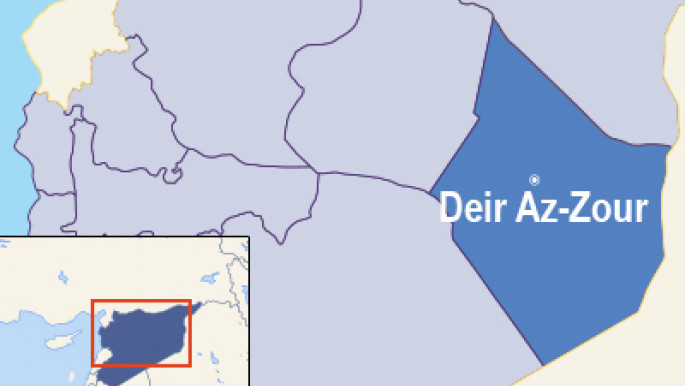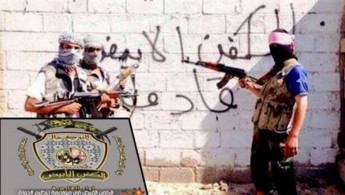Syrian rebels, and their clandestine war against IS
On Monday night, a secret group of Syrian revolutionaries known as The White Shroud sneaked into a Iraqi border town ruled by the iron-fisted Islamic State group.
In the near silence of al-Bukamal town, they killed three men from the district's notorious religious police forces - infamous for their merciless implementation of "religious" law - and hastily painted slogans against the militant group on the walls of a school.
When IS militants explored the area the following morning, they found their dead comrades with a chilling message:
"Wait for us this week, and the Islamic State will fall."
Resistance
The White Shroud is a Free Syrian Army commando unit of around 25 fighters tasked with carrying out limited guerrilla attacks on IS units in Deir az-Zour province.
Together with a small group of activists, they make up la résistance against Abu Bakr al-Baghdadi's militants in largely IS-held eastern Syria.
 |
Over the past ten days, they have stepped up their attacks on IS militants and earlier this week managed to kidnap a number of sharia law enforcers in the eastern province.
"Secrecy is the most important element of the White Shroud's work," is the motto of the group's commander, Abu Aboud.
Given the authoritarian nature of IS, which operates a security apparatus modelled on the regime's mukhabarat intelligence service, the White Shroud operates under exceptional circumstances.
"There has been no huge number of anti-IS fighters and activists in Deir az-Zour, and this is due to the brutally carried out by the group," said Omar Abu Layal, a former spokesperson for the FSA in eastern Syria, and now CEO of Deir Ezzor 24, a website that details life in the province.
"At the current time the White Shroud work in secret, because [most opponents] do not have the capabilities to face the group's terror, savagery and brutality."
Silenced
IS maintains tight controls over internet access in its territories and enforces a strict embargo of news coming in and out of its provinces.
"Deir Ezzor 24 Network struggled and managed to break the media blackout imposed by the organisation on the whole region and release daily reports on IS atrocities," said Abu Layal.
|
|
IS fighters are likely feeling emboldened after last week's devastating terror attacks in Paris, but also aware that the world has turned decisively against them.
French, Russian and coalition bombing of their self-declared capital has sent Raqqa into a state of pandemonium as civilians - and reportedly IS leaders - attempt to flee the city for Turkey.
Militants have dug trenches and tunnels and are attempting to melt away into the civilian preparation, fearing an imminent assault on the city.
Although the fight against IS is not at a stage where the militants are making a "last stand" in Raqqa, the extremists have every reason to be afraid.
Months of coalition air raids and drones strikes have gradually cut down the fighting force in size, and killed many of the group's foreign militants including IS poster boy "Jihadi John".
The group's experimental economic and social constructs have also proven to be a failure.
Now that anti-IS air raids are focused on the group's financial heart - refineries and oil tankers - the group could be about to lose its main source of income.
Exodus
Economic mismanagement has led the group to force through harsh and punitive taxes on the local population.
Local activists say that, like their predecessors al-Qaeda in Iraq, lS militants have become accustomed to lording over the local population - yet hold deep suspicions over the loyalty of their subjects and comrades alike.
"Daesh [The Arabic acronym for IS] considers the local population to be infidels and do not trust them," said Tim, the name adopted by the Syrian activist from Raqqa is Being Slaughtered Silently.
Following IS' tragic operation in Paris - killing 130 people - activists are suspicious about the Syrian passport found among the bodies.
Many believe that the militant group might be attempting to stir up European xenophobia to halt the exodus of refugees from the "caliphate".
Educated and middle class Syrians in particular are fleeing for Turkey and Europe in their droves.
They have grown tired of the poverty, bombs and drabness of the "caliphate" - and fear they might be next to be conscripted into IS' death cult army as the militants lose more men.
|
|
"We should not forget that education under the rule of IS has stopped completely and there are no job opportunities available," said Abu Layal.
Those who remained have led some remarkable and brave protests against IS rule.
Over the past three days, locals in Mu Hassan, al-Mayadeen, al-Bukamal have all protested on the streets against IS' brutality.
They also pointed out that dozens of civilians had been killed by French and Russian bombs, while no IS fighters reportedly died - a thinly veiled attack on IS policies of moving military hardware and fighters into civilian areas.
"The protesters raised the flag of the Syrian revolution in these three cities. This is a clear sign that the people are starting to rebel against IS, step-by-step, as they did before with the Assad regime," said the Deir az-Zour activist.
Defiance
The significance of this act of defiance should not be underplayed as the group faces a two-pronged attack in Syria and Iraq from the Kurds and allied units.
|
|
|
|
Kurdish fighters in the Syrian Democratic Forces in Aleppo province [YPG] |
In Raqqa province, FSA fighters under the revolutionary banner - along with their Kurdish comrades - have been slowly advancing towards IS' "capital".
The "Islamist" credentials of these factions are also a huge threat to Baghdadi's extremist group - which claims to be the rightful protector of Syria and Iraq's Sunni populations.
In Deir az-Zour, Abu Layal believes a major offensive by rebel groups in-and-around the province, such as The Lions of the Eastern Region, is likely.
IS understands the importance of Deir az-Zour as the main supply line between its territories in Iraq and Syria.
"They are so afraid of the FSA in Deir az-Zour, and that is why they are now focusing [their forces here] more than Raqqa," he said.
"We should not forget the formation of the Syrian Democratic Forces (tasked with fighting IS) includes FSA fighters who previously fought against IS in Deir az-Zour."
Many activists believe that, although the Kurds are effective fighters, they are directing their efforts solely at liberating Kurdish areas from IS, and have little interest in losing men for Arab towns and cities.
That is why the fight for Raqqa and Deir az-Zour needs to come from Syrian Arabs, in particular anti-IS locals, say analysts.
"The people in the eastern region only show support to the FSA," said Tim. "And they clearly understand that they are the only ones who can retake al-Sharqiya from IS."
Follow Paul McLoughlin on Twitter: @pmcloughlin9



